Do We Judge Others By Their Music Taste?
Social Stereotypes in the Music Scene

By day, Dr Hélder Raposo, 45, is a Senior Sociology Lecturer at a university in Lisbon. By night, he is the Lead Singer of an industrial rock band.
"When someone finds out the kind of band I sing in, they get perplexed and curious to understand this kind of ‘double personality’ of mine," Hélder says.
Hélder has been a Sociology Lecturer at ISCTE-IUL for seven years. His friends and family describe him as a discreet person.

Hélder Raposo, Senior Sociology Lecturer
Hélder Raposo, Senior Sociology Lecturer
That is why they get incredulous when finding out that Hélder is the Lead Singer of the band Uivo Bastardo, mainly when they see him perform.
Uivo Bastardo performing at RCA
Uivo Bastardo performing at RCA
"It is a stereotype to assume that someone who likes 'heavy music' has a very determined profile. The range of people who like this type of music is so diversified, and I am the prime example of that," Hélder says.
Studies have shown that people tend to stereotype others based on their music taste.
Dr Julian Oldmeadow, co-author of the You Are What You Listen To: Young People's Stereotypes about Music Fans study, says: "Stereotypes in music absolutely exist, but these are socially constructed stereotypes, rather than meanings inherent in the music itself. The sorts of opinions, values and attitudes implied in different genres are sometimes quite direct, such as through the lyrics, but they are also constructed through associations we learn about from others."
Dr Oldmeadow's study examined whether there are widely shared stereotypes about people who enjoy different types of music, and it was found that different musical genres were associated with particular personality traits, personal values, as well as ethnic and social groups.
For example, classical and jazz music fans were rated high on 'Agreeableness' and 'Emotional Stability', whereas fans of both rock and electronica were rated high on 'Extraversion and Openness'. Classical fans were seen as higher on 'Political Conservatism', 'Intelligence', 'Religiosity', and 'Artistic Ability'; and lower on 'Athletic Ability'.
The research also showed that the working class is believed to listen more to rap and pop while the upper class would listen more to classical music and jazz:

Dr Julian Oldmeadow, Social Psychologist and Lecturer at Swinburne University of Technology in Melbourne, Australia.
Dr Julian Oldmeadow, Social Psychologist and Lecturer at Swinburne University of Technology in Melbourne, Australia.
According to Dr Oldmeadow, there is a lot of debate around whether these stereotypes contain an element of truth.
He says: "Many stereotypes about groups are clearly false. However, music stereotypes may carry a larger kernel of truth because, firstly, people are drawn to music genres that carry meanings consistent with their own self-concept, and secondly, identifying with a certain music genre informs the self-concept. If you are drawn to a particular genre, you might find yourself internalising some of the values associated with that."
Dr Oldmeadow describes this as a sort of vicious circle: You are drawn to music genres that share the same values as you, and stereotypes are created by the values most associated with a music genres' audience.
"On the one hand, our music tastes reflect what music we enjoy, and studies suggest this is partly genetic. However, it's also very much a social process. Our tastes depend on our culture, what we are exposed to, and importantly, the connection between music and the groups we belong to and value. On the other hand, we also develop tastes in music because we value a certain social identity that goes with that music, and use music as an expression of identity," Dr Oldmeadow says.
A study carried out by Sociology Professor at James Madison University Dr Bethany Bryson, "Anything But Heavy Metal": Symbolic Exclusion and Musical Dislikes, shows that the assumptions made in Dr Oldmeadow's research are largely true.
This study explores the connection between the educational level of individuals and their music taste, based on the General Social Survey 1993 responses related to the liking of 18 music genres.
Dr Bryson has used the mean educational level of the people who answered this survey to determine the genre's audience mean educational level.
While classical music and jazz are well above the sample average education, making these genres' audiences more likely to belong to the upper-class, rap and heavy metal are under the sample mean education level, making them more likely to be from the working class.
Even if there are similarities in a music genre's audience, why do we use these to stereotype and make generalizations?
Dr Oldmeadow says: "Our brains are hard-wired to make inferences about what people are like based on what they do and what they look like. Listening to certain types of music is a form of behaviour that carries a lot of information through the stereotypes we have about those genres. We almost can’t help but make inferences about what a person is like based on the music they enjoy."
This is what studies have shown us, but do we really have these music stereotypes in the back of our minds?
Let's test your stereotypes!
Based on a study carried out by Adam J. Lonsdale and Adrian C. North (2009)
Unlike the individuals described in the quiz, Hélder Raposo is a real person, and he is a target of stereotyping on a day-to-day basis.
Hélder Raposo
Living a double life
Hélder's professional path has always been deeply connected with the health sector, having started working at the age of 19 as an Administrative Assistant at the Portuguese Institute of Oncology.
While he was working there, Hélder started taking his undergraduate degree in Sociology at night and fell in love with the area. Soon enough, he applied for a Master of Science that would allow him to do research in scientific projects.
After some months of working on his research, Hélder got the opportunity to start teaching in Higher Education, and did not hesitate to take that path.
Later, Hélder got a PhD in this area, and now his work is entirely dedicated to teaching and doing research on Sociology applied to Health.
In his free time, Hélder is the Lead Singer of Uivo Bastardo, an industrial rock band, or a 'brute, visceral, and vociferous Portuguese rock band', as Hélder describes it.
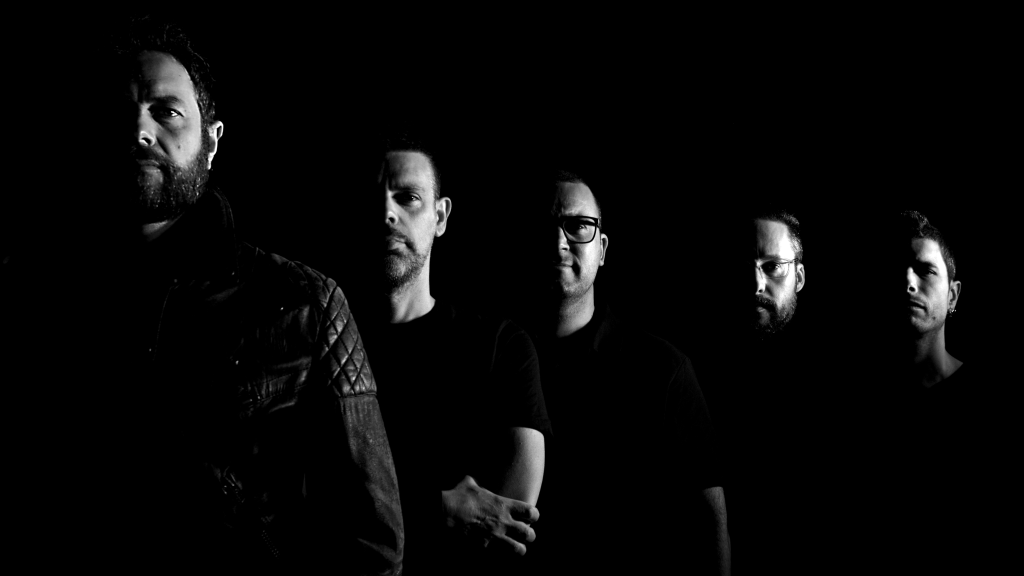
"The creation of the band was an act of perseverance," Hélder says. He had been part of several bands before, but Hélder felt these never let him explore the potential he hoped to achieve and fulfil his most ambitious ideas.
With the split of his former band, Hélder saw himself in a dilemma: he could give up on his passion for music, or he could make the ultimate effort to reinvent it from the rubble.
In 2017, still without new members, he made the decision to hire a producer and that is when Uivo Bastardo was born.
The band started evolving in the way he hoped - it got new members and they started recording their first album - and, in May 2019, they released their first record: Clepsydra.
Their first single is called Ignífero.
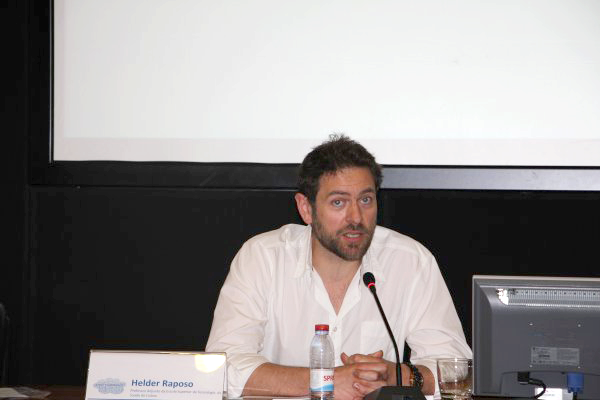
Dr Hélder Raposo, Sociology Senior Lecturer
Dr Hélder Raposo, Sociology Senior Lecturer

Dr Hélder Raposo, Sociology Senior Lecturer
Dr Hélder Raposo, Sociology Senior Lecturer

Hélder Raposo, Lead Singer of Uivo Bastardo
Hélder Raposo, Lead Singer of Uivo Bastardo
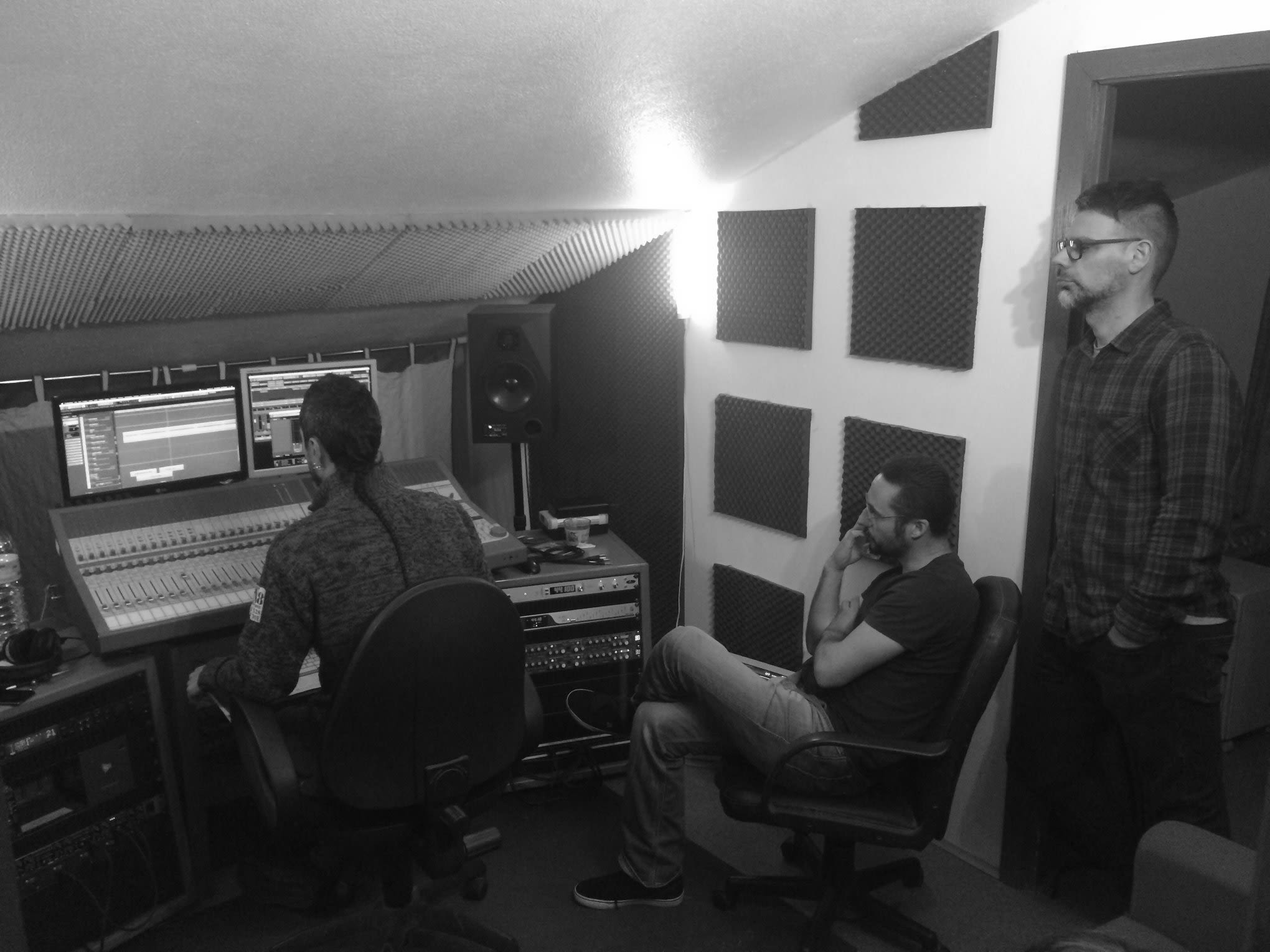
Uivo Bastardo rehearsals
Uivo Bastardo rehearsals

"Without a doubt, there are stereotypes associated with the music I sing."
Hélder has been a target of these stereotypes for a long time. When people find out he is the Lead Singer of an industrial rock band, they just automatically associate him with violence and aggressiveness.

"Due to a lot of people's lack of knowledge of 'heavy rock', this music genre is associated with brute violence, musical poverty, and chaotic aggressiveness with hardly any harmony," Hélder says.
According to Hélder, as it happens with most forms of stereotyping, these are inevitable consequences of misjudgements which are based on categorizing as 'weird' things that go against what is referred to as 'normal'.
"These misjudgements, mainly if they are based on prejudice, are never fair or correct, as they are a ‘caricatural’ perception of others," Hélder affirms.

He says that maybe in more niche manifestations being stereotypical is almost automatic, but nowadays 'heavy music' has such ample dissemination that it is very hard to make associations between music genres and groups.
Hélder adds: "If we do that, we are falling into an artificial and stereotypical cycle."
"...it is a waste to limit ourselves to only one music genre."
Even if Hélder is associated with the stereotypes of 'heavy rock', and this is his favourite music style, he listens to various music genres in his free time. Not only out of curiosity in knowing and exploring new and different things, but also, and mainly because music has many possibilities.
"The range of states of mind, sensations, and intellectual stimulation music gives us is so big that it is always a good principle to be open-minded. Not allowing ourselves to explore all these different sounds is almost a crime," Hélder says.

To Hélder, sometimes it is good to do without the heaviness and intensity of rock in favour of other music genres, from EDM to classical music, pop, and even some pimba (a type of Portuguese popular / folk music, with an up-tempo style and vulgar lyrics).
Hélder says: "This is why I believe people should not be judged by their preferred music genre. Humans are a mix of endless characteristics and all of us probably listen to more than one music genre, so we should not be deemed for only one of our features."
"When someone finds out I am in a heavy rock band..."
Hélder is naturally a calm and discreet person, so these are generally the characteristics that people associate him with when they first meet him.
"What usually happens is that when someone - either from my family, less-close friends and work colleagues - finds out I am in a heavy rock band, they are incredulous, as they do not associate that with my discreet personality," Hélder says.

From the moment people find out he is in a heavy rock band, people's perception of Hélder changes, even though his personality is the same.
Hélder concludes: "They get perplexed and sometimes are curious to understand this kind of ‘double personality’. It is like I am a character from the famous Gothic novella Strange Case of Dr Jekyll and Mr Hyde."
Hélder tries to keep his professional and personal life separated to not be misjudged at work as that has already brought him problems professionally.
"One time, I was turned down for a lecturing job because the hiring manager found a performance of Uivo Bastardo online and he thought I would be aggressive to the students. All because of my tone singing. I don't want that to happen again..."
Marco Alves
Not cultivating the stereotype
Marco is a Lyrical Singer, mainly singing opera but also doing other types of classical music repertoire.
He took an undergraduate degree in Vocal Studies at Guildhall School of Music & Drama, and a masters' at the same university, in Performance.
After that, Marco went to a young artists' programme at the Opéra national du Rhin, where he stayed for about one year, developing his performance and singing abilities.
Today, he is a freelance Singer. Marco sings mainly in Portugal, but occasionally abroad. In Portugal, he sings at famous operas in Lisbon, with the most-known Portuguese orchestras.
Despite his success in the classical music scene, no one who meets Marco for the first time would guess what he does for a living.
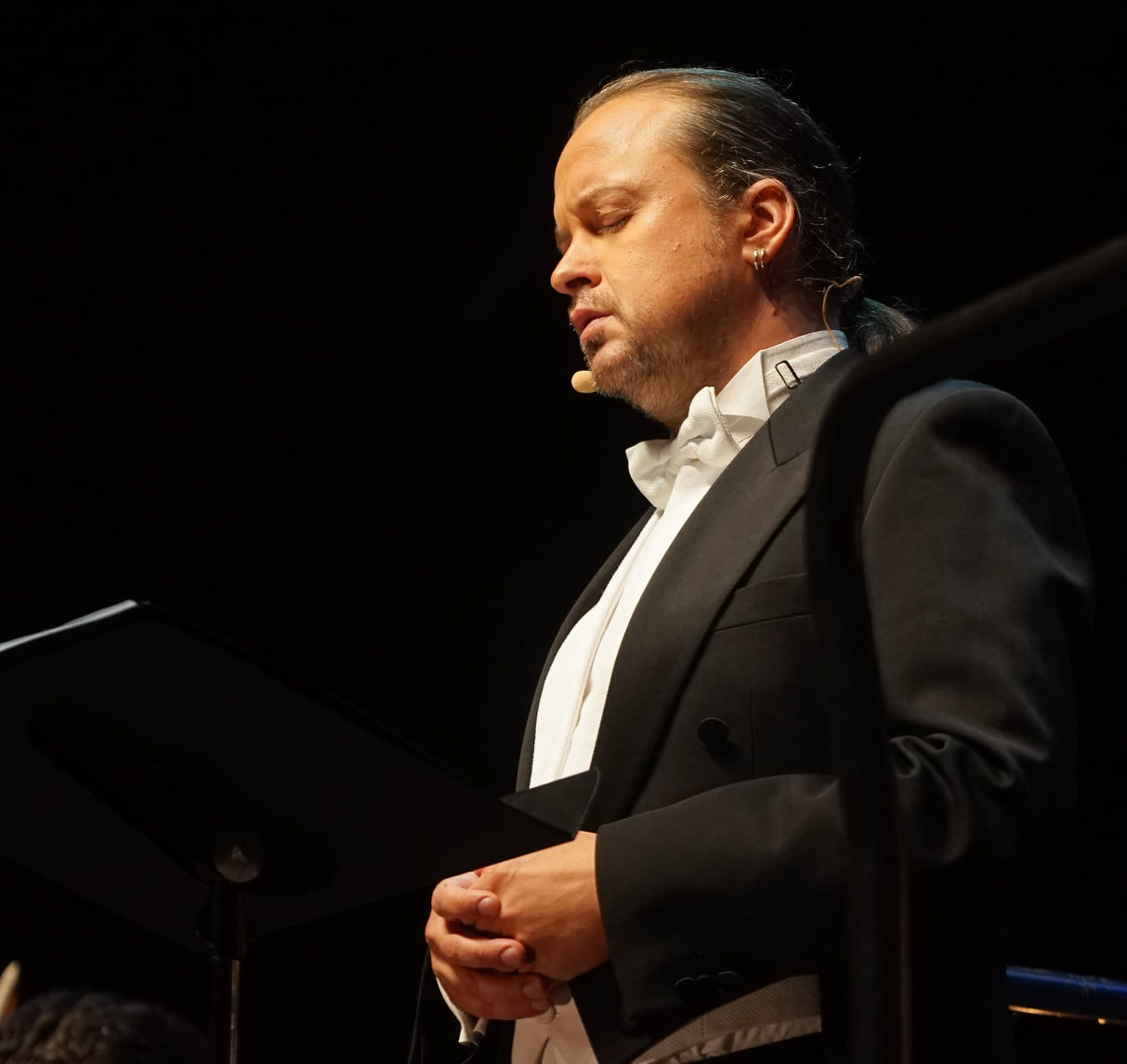
Marco performing at EGEAC/Gulbenkian
Marco performing at EGEAC/Gulbenkian
"Nobody thinks I'm an opera singer."
When Marco is performing in an opera, he is undeniably associated with the characteristics of classical music.
"I think that is in part because of how the public sees or portrays artists in relation to classical music: you would have the fat lady who sings opera, or the piano nerd, or the drunken brass player." Marco says.
However, on a day-to-day basis, no one would say Marco sings opera professionally. He has long hair, always wears black, has a piercing on his ear, and uses a lot of slang.
According to Marco, when he tells people what he does for a living, nobody believes him at first.

"I don't cultivate that stereotype. I don't have a really big presence on social media, I love football, and the main thing is that the music genre I listen to the most in my free time is heavy metal," Marco says.
Having said that, Marco admits he has colleagues that still fit into that old stereotypical mould. But, most of the time nowadays, most classical singers do not look like classical singers. And that is why Marco believes there shouldn't be determined stereotypes associated with classical musicians anymore, this belongs to the past.
"I'm quite free to disclose my preferred music genres."
Even though people get quite surprised when he tells them he is an opera singer, Marco doesn't mind telling his work colleagues what he listens to in his free time.
"Being a classical musician means that you've studied music for at least 20 years, so we normally don't have any problems saying the types of music we listen to, people will not associate us with those because they already connect us with classical music stereotypes," Marco says.
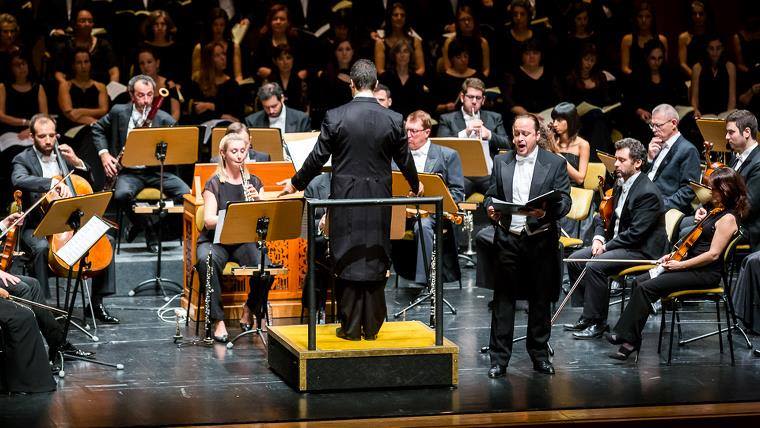
Marco does not like stereotypes themselves, but he admits that sometimes he takes advantage of these when facing other music genres' musicians.
"Because of the stereotypes associated with classical music, when I say I'm a professional classical musician, other musicians basically bow down. I know I'm being a smartass by saying this, but if we're talking about stereotypes, well, that's it," Marco concludes.
"I don't mind people misjudging me for my music tastes anymore."
Marco says that people are misjudged by their music taste. Not only that, but by many things in their life: their food taste, their sports tastes... People are misjudged all the time for all the reasons.
"People should not be misjudged by the way they dress or their musical taste or what they eat or look like. But then again, that's how society works," Marco says.
Marco has been an opera singer for 20 years now, having been stereotyped for the same amount of years, so he doesn't find important what people might think about him anymore or if they misjudge him by his musical tastes.

"I think you reach a certain age and a certain professional experience in this career and you just get along well either with critic or misjudgement. But obviously, this should not happen to anyone," Marco concludes.

Manuel Anglada-Tort, postdoc Researcher at the Max Planck Institute for Empirical Aesthetics
Manuel Anglada-Tort, postdoc Researcher at the Max Planck Institute for Empirical Aesthetics
Even if stereotyping does not affect Marco anymore, he still admits these exist and may affect other people, like Hélder. What Marco does not understand is why do people make assumptions based on stereotypes?
Manuel Anglada-Tort, a postdoc Researcher in the Computational Auditory Perception Group at the Max Planck Institute for Empirical Aesthetics, Germany, tries to explain this.
Manuel's background is in psychology, music cognition, and research methods, and he is mostly interested in understanding how humans process, create, experience, and respond to aesthetics and auditory stimuli, such as music.
According to Manuel, people make assumptions based on stereotypes because of their probability to be true: they rely on representativeness heuristics.
"I believe the stereotypes associated with 'heavy music' are mostly created by those who are more distant and less knowledgeable of this music genre," Hélder concludes.
He says these people put all the variants of 'heavy music' (the multiple variations of rock and metal) under the label of 'rock', which is too broad for the endless sounds this kind of music brings.
Hélder does not identify himself with the violence and aggressiveness associated with this music style, but due to the social stereotypes associated with the type of music he sings, people outside of his close circle may perceive him like that.
"This is just something I have to deal with as singing this type of music is my passion. All that matters is that I, my family, and my friends know who I am."